ECO 6201 Business Economics: Market Failure of Food Waste in Malaysia
VerifiedAdded on 2023/04/11
|11
|2554
|488
Essay
AI Summary
This essay discusses the market failure in Malaysia caused by the increasing problem of food waste. It identifies lack of information and knowledge, and negative externalities as key factors contributing to this failure. The essay reviews existing policies implemented by the Malaysian government to address food waste, including initiatives by the National Solid Waste Management Department and the Solid Waste Management and Public Cleansing Corporation. It also recommends several policies to correct the market failure, such as organic waste bans, recycling laws, generator treatment, pricing strategies, enforcement mechanisms, technical support, infrastructure development, taxes, and subsidies, emphasizing a comprehensive approach covering all stages from production to disposal. This document is available on Desklib, a platform offering a wide range of study resources for students.
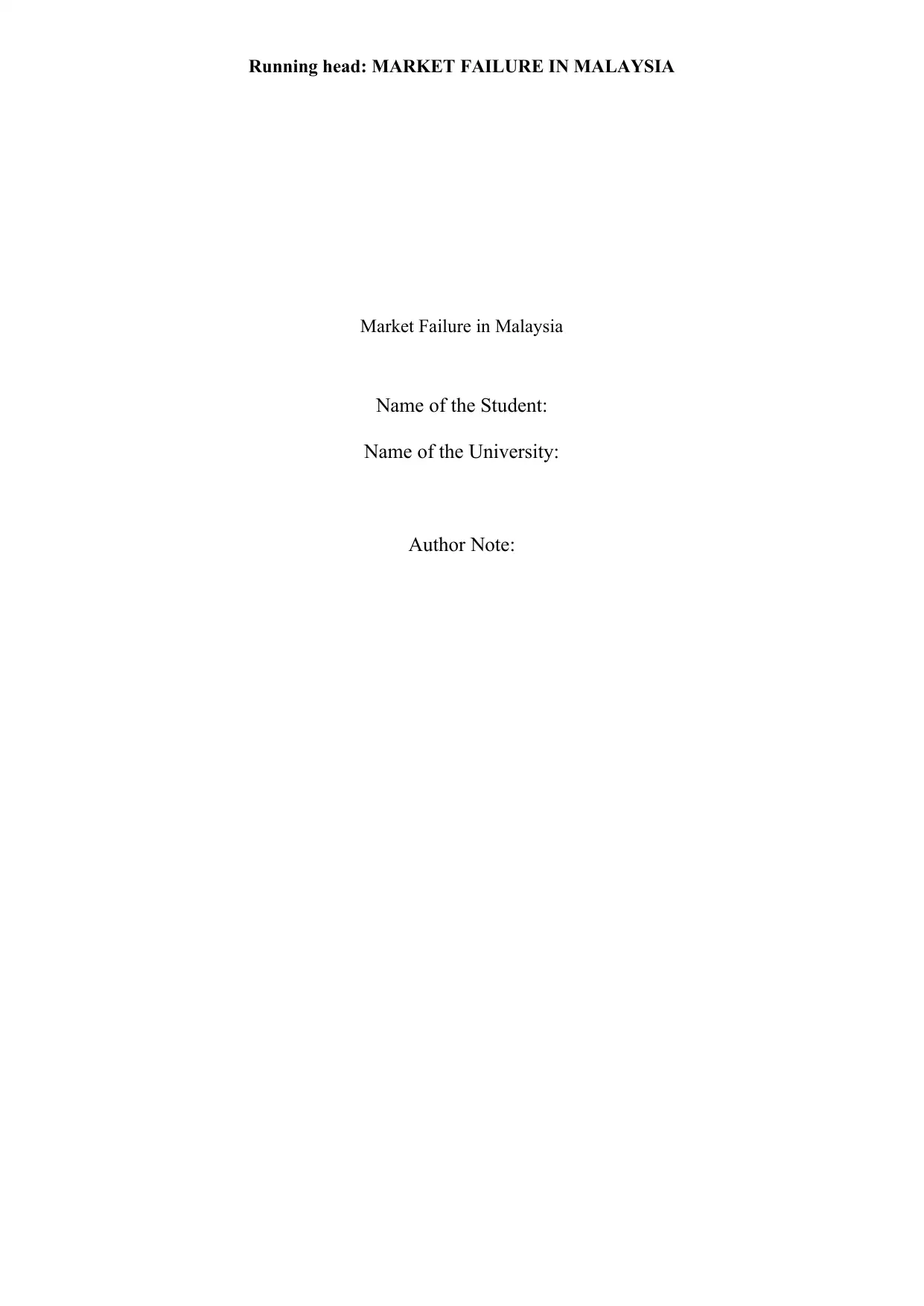
Running head: MARKET FAILURE IN MALAYSIA
Market Failure in Malaysia
Name of the Student:
Name of the University:
Author Note:
Market Failure in Malaysia
Name of the Student:
Name of the University:
Author Note:
Paraphrase This Document
Need a fresh take? Get an instant paraphrase of this document with our AI Paraphraser
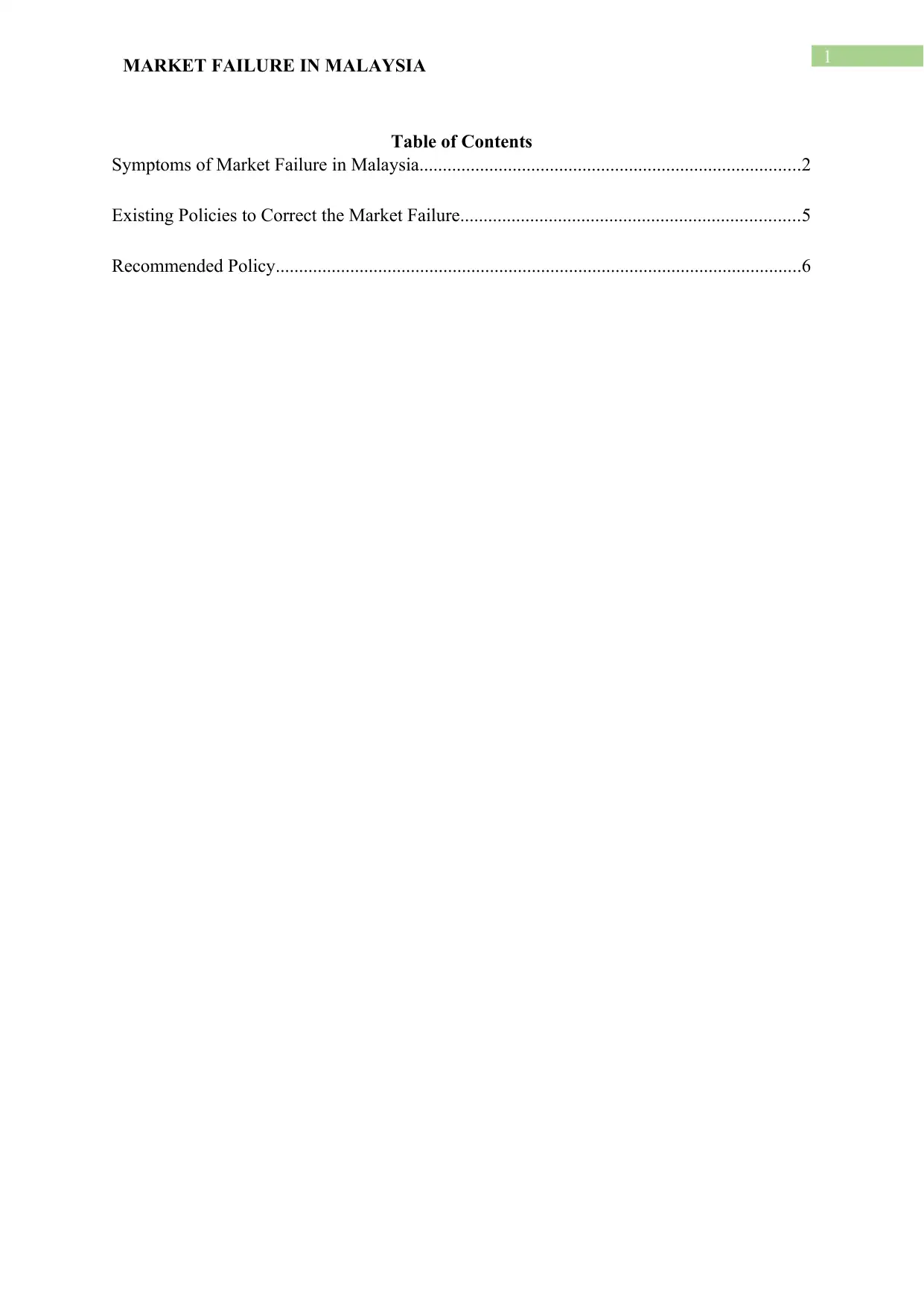
1MARKET FAILURE IN MALAYSIA
Table of Contents
Symptoms of Market Failure in Malaysia..................................................................................2
Existing Policies to Correct the Market Failure.........................................................................5
Recommended Policy.................................................................................................................6
Table of Contents
Symptoms of Market Failure in Malaysia..................................................................................2
Existing Policies to Correct the Market Failure.........................................................................5
Recommended Policy.................................................................................................................6
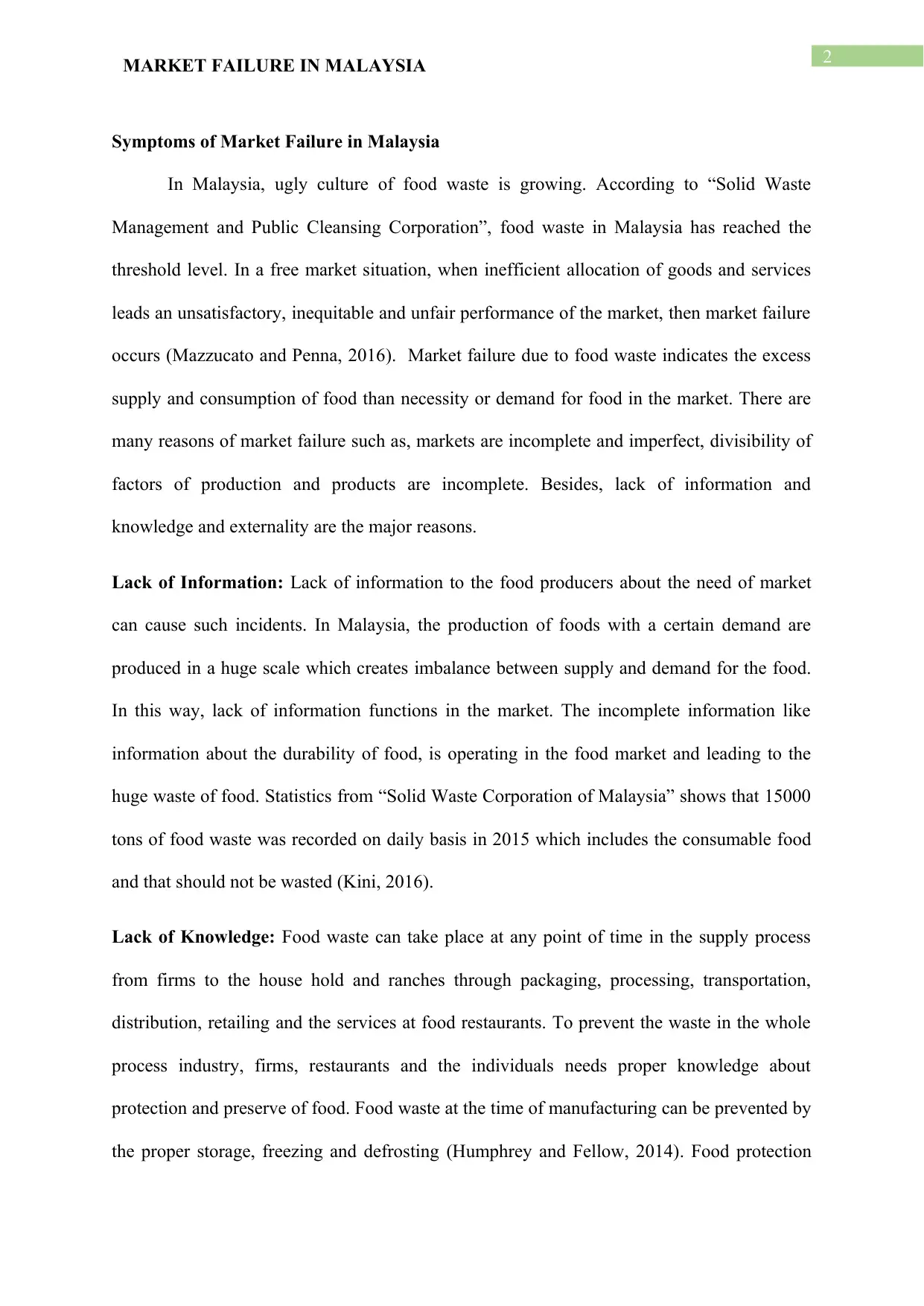
2MARKET FAILURE IN MALAYSIA
Symptoms of Market Failure in Malaysia
In Malaysia, ugly culture of food waste is growing. According to “Solid Waste
Management and Public Cleansing Corporation”, food waste in Malaysia has reached the
threshold level. In a free market situation, when inefficient allocation of goods and services
leads an unsatisfactory, inequitable and unfair performance of the market, then market failure
occurs (Mazzucato and Penna, 2016). Market failure due to food waste indicates the excess
supply and consumption of food than necessity or demand for food in the market. There are
many reasons of market failure such as, markets are incomplete and imperfect, divisibility of
factors of production and products are incomplete. Besides, lack of information and
knowledge and externality are the major reasons.
Lack of Information: Lack of information to the food producers about the need of market
can cause such incidents. In Malaysia, the production of foods with a certain demand are
produced in a huge scale which creates imbalance between supply and demand for the food.
In this way, lack of information functions in the market. The incomplete information like
information about the durability of food, is operating in the food market and leading to the
huge waste of food. Statistics from “Solid Waste Corporation of Malaysia” shows that 15000
tons of food waste was recorded on daily basis in 2015 which includes the consumable food
and that should not be wasted (Kini, 2016).
Lack of Knowledge: Food waste can take place at any point of time in the supply process
from firms to the house hold and ranches through packaging, processing, transportation,
distribution, retailing and the services at food restaurants. To prevent the waste in the whole
process industry, firms, restaurants and the individuals needs proper knowledge about
protection and preserve of food. Food waste at the time of manufacturing can be prevented by
the proper storage, freezing and defrosting (Humphrey and Fellow, 2014). Food protection
Symptoms of Market Failure in Malaysia
In Malaysia, ugly culture of food waste is growing. According to “Solid Waste
Management and Public Cleansing Corporation”, food waste in Malaysia has reached the
threshold level. In a free market situation, when inefficient allocation of goods and services
leads an unsatisfactory, inequitable and unfair performance of the market, then market failure
occurs (Mazzucato and Penna, 2016). Market failure due to food waste indicates the excess
supply and consumption of food than necessity or demand for food in the market. There are
many reasons of market failure such as, markets are incomplete and imperfect, divisibility of
factors of production and products are incomplete. Besides, lack of information and
knowledge and externality are the major reasons.
Lack of Information: Lack of information to the food producers about the need of market
can cause such incidents. In Malaysia, the production of foods with a certain demand are
produced in a huge scale which creates imbalance between supply and demand for the food.
In this way, lack of information functions in the market. The incomplete information like
information about the durability of food, is operating in the food market and leading to the
huge waste of food. Statistics from “Solid Waste Corporation of Malaysia” shows that 15000
tons of food waste was recorded on daily basis in 2015 which includes the consumable food
and that should not be wasted (Kini, 2016).
Lack of Knowledge: Food waste can take place at any point of time in the supply process
from firms to the house hold and ranches through packaging, processing, transportation,
distribution, retailing and the services at food restaurants. To prevent the waste in the whole
process industry, firms, restaurants and the individuals needs proper knowledge about
protection and preserve of food. Food waste at the time of manufacturing can be prevented by
the proper storage, freezing and defrosting (Humphrey and Fellow, 2014). Food protection
⊘ This is a preview!⊘
Do you want full access?
Subscribe today to unlock all pages.

Trusted by 1+ million students worldwide
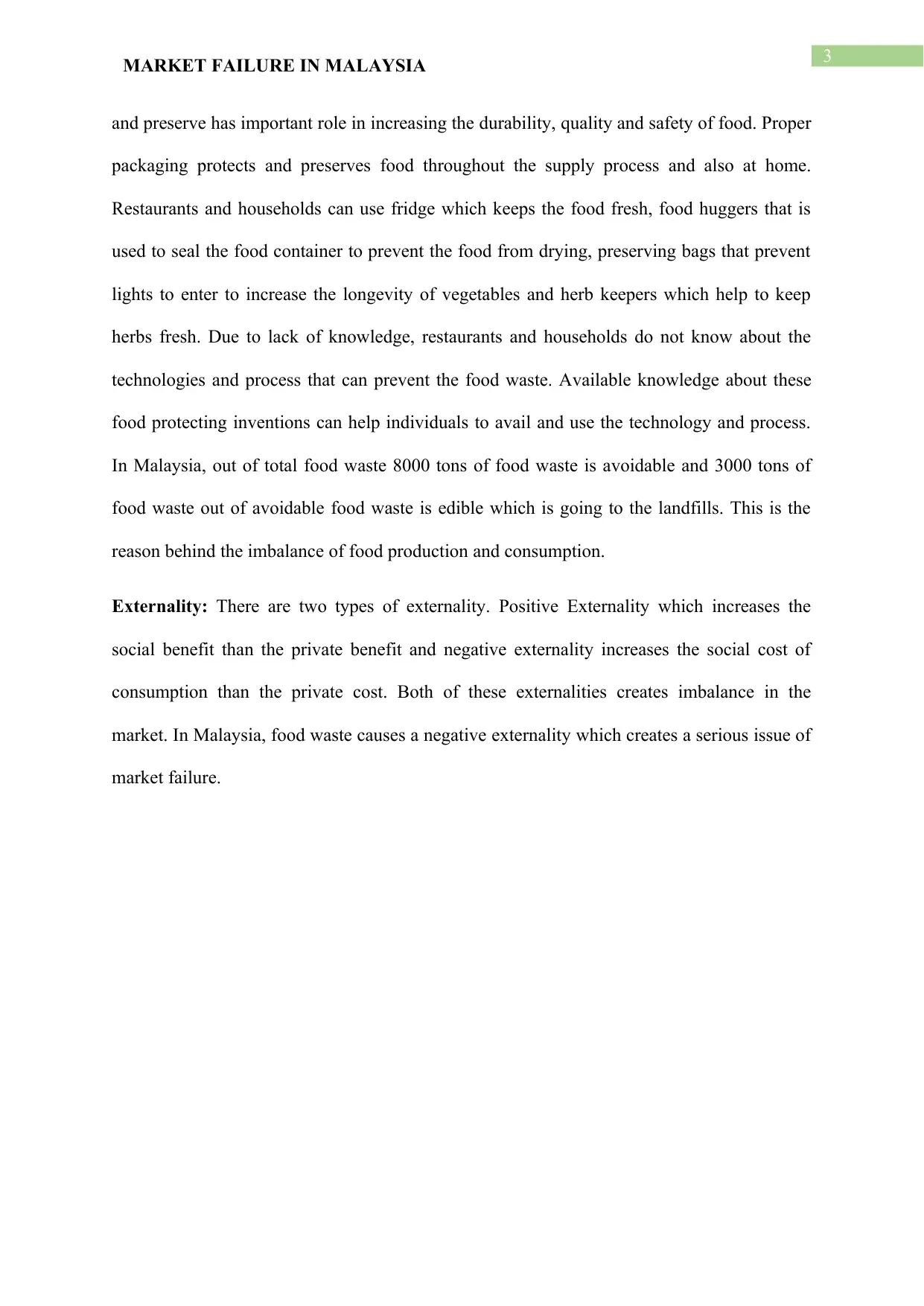
3MARKET FAILURE IN MALAYSIA
and preserve has important role in increasing the durability, quality and safety of food. Proper
packaging protects and preserves food throughout the supply process and also at home.
Restaurants and households can use fridge which keeps the food fresh, food huggers that is
used to seal the food container to prevent the food from drying, preserving bags that prevent
lights to enter to increase the longevity of vegetables and herb keepers which help to keep
herbs fresh. Due to lack of knowledge, restaurants and households do not know about the
technologies and process that can prevent the food waste. Available knowledge about these
food protecting inventions can help individuals to avail and use the technology and process.
In Malaysia, out of total food waste 8000 tons of food waste is avoidable and 3000 tons of
food waste out of avoidable food waste is edible which is going to the landfills. This is the
reason behind the imbalance of food production and consumption.
Externality: There are two types of externality. Positive Externality which increases the
social benefit than the private benefit and negative externality increases the social cost of
consumption than the private cost. Both of these externalities creates imbalance in the
market. In Malaysia, food waste causes a negative externality which creates a serious issue of
market failure.
and preserve has important role in increasing the durability, quality and safety of food. Proper
packaging protects and preserves food throughout the supply process and also at home.
Restaurants and households can use fridge which keeps the food fresh, food huggers that is
used to seal the food container to prevent the food from drying, preserving bags that prevent
lights to enter to increase the longevity of vegetables and herb keepers which help to keep
herbs fresh. Due to lack of knowledge, restaurants and households do not know about the
technologies and process that can prevent the food waste. Available knowledge about these
food protecting inventions can help individuals to avail and use the technology and process.
In Malaysia, out of total food waste 8000 tons of food waste is avoidable and 3000 tons of
food waste out of avoidable food waste is edible which is going to the landfills. This is the
reason behind the imbalance of food production and consumption.
Externality: There are two types of externality. Positive Externality which increases the
social benefit than the private benefit and negative externality increases the social cost of
consumption than the private cost. Both of these externalities creates imbalance in the
market. In Malaysia, food waste causes a negative externality which creates a serious issue of
market failure.
Paraphrase This Document
Need a fresh take? Get an instant paraphrase of this document with our AI Paraphraser
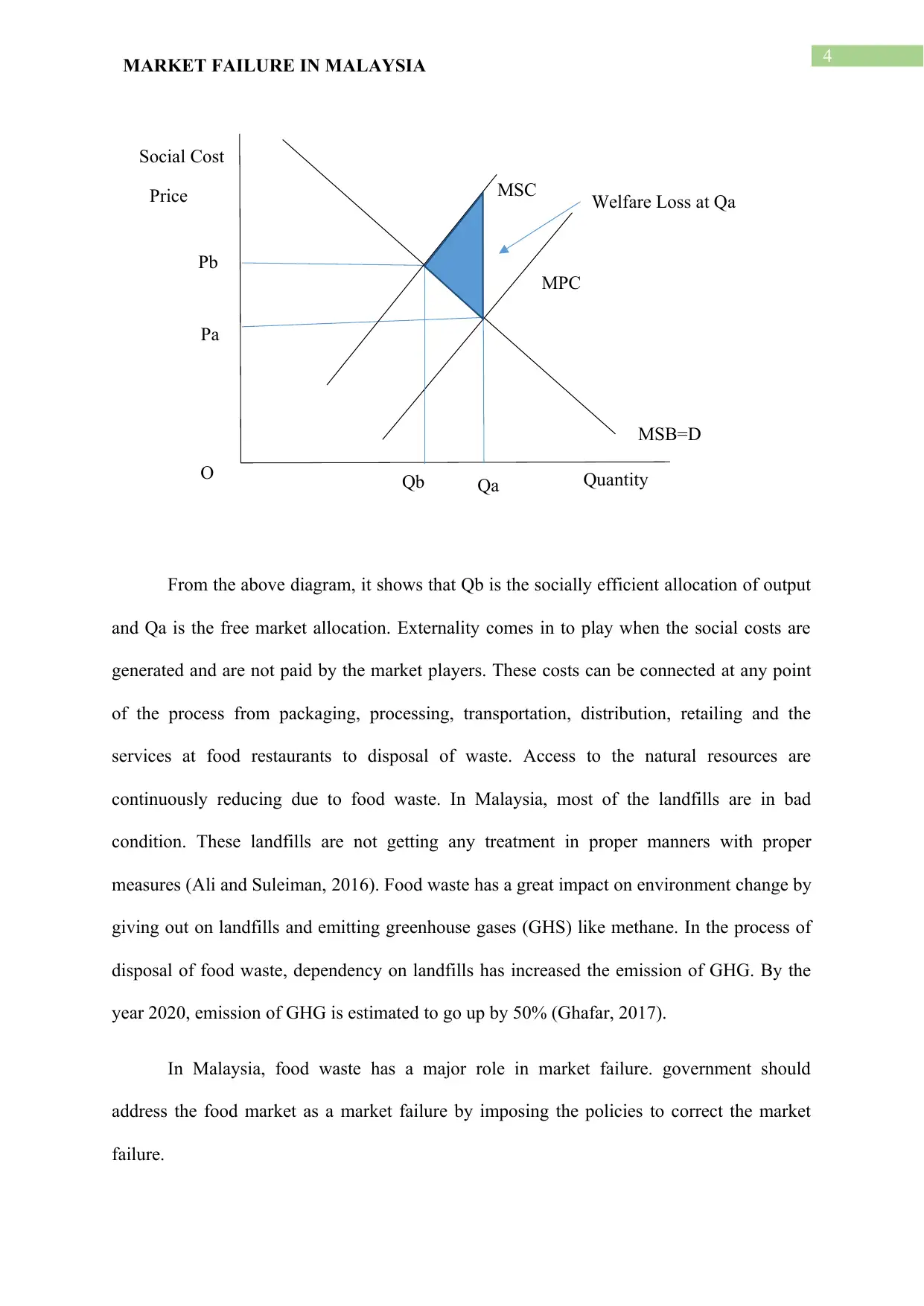
4MARKET FAILURE IN MALAYSIA
Social Cost
Quantity
Price
Pb
O
MPC
QaQb
Pa
MSC
MSB=D
Welfare Loss at Qa
From the above diagram, it shows that Qb is the socially efficient allocation of output
and Qa is the free market allocation. Externality comes in to play when the social costs are
generated and are not paid by the market players. These costs can be connected at any point
of the process from packaging, processing, transportation, distribution, retailing and the
services at food restaurants to disposal of waste. Access to the natural resources are
continuously reducing due to food waste. In Malaysia, most of the landfills are in bad
condition. These landfills are not getting any treatment in proper manners with proper
measures (Ali and Suleiman, 2016). Food waste has a great impact on environment change by
giving out on landfills and emitting greenhouse gases (GHS) like methane. In the process of
disposal of food waste, dependency on landfills has increased the emission of GHG. By the
year 2020, emission of GHG is estimated to go up by 50% (Ghafar, 2017).
In Malaysia, food waste has a major role in market failure. government should
address the food market as a market failure by imposing the policies to correct the market
failure.
Social Cost
Quantity
Price
Pb
O
MPC
QaQb
Pa
MSC
MSB=D
Welfare Loss at Qa
From the above diagram, it shows that Qb is the socially efficient allocation of output
and Qa is the free market allocation. Externality comes in to play when the social costs are
generated and are not paid by the market players. These costs can be connected at any point
of the process from packaging, processing, transportation, distribution, retailing and the
services at food restaurants to disposal of waste. Access to the natural resources are
continuously reducing due to food waste. In Malaysia, most of the landfills are in bad
condition. These landfills are not getting any treatment in proper manners with proper
measures (Ali and Suleiman, 2016). Food waste has a great impact on environment change by
giving out on landfills and emitting greenhouse gases (GHS) like methane. In the process of
disposal of food waste, dependency on landfills has increased the emission of GHG. By the
year 2020, emission of GHG is estimated to go up by 50% (Ghafar, 2017).
In Malaysia, food waste has a major role in market failure. government should
address the food market as a market failure by imposing the policies to correct the market
failure.
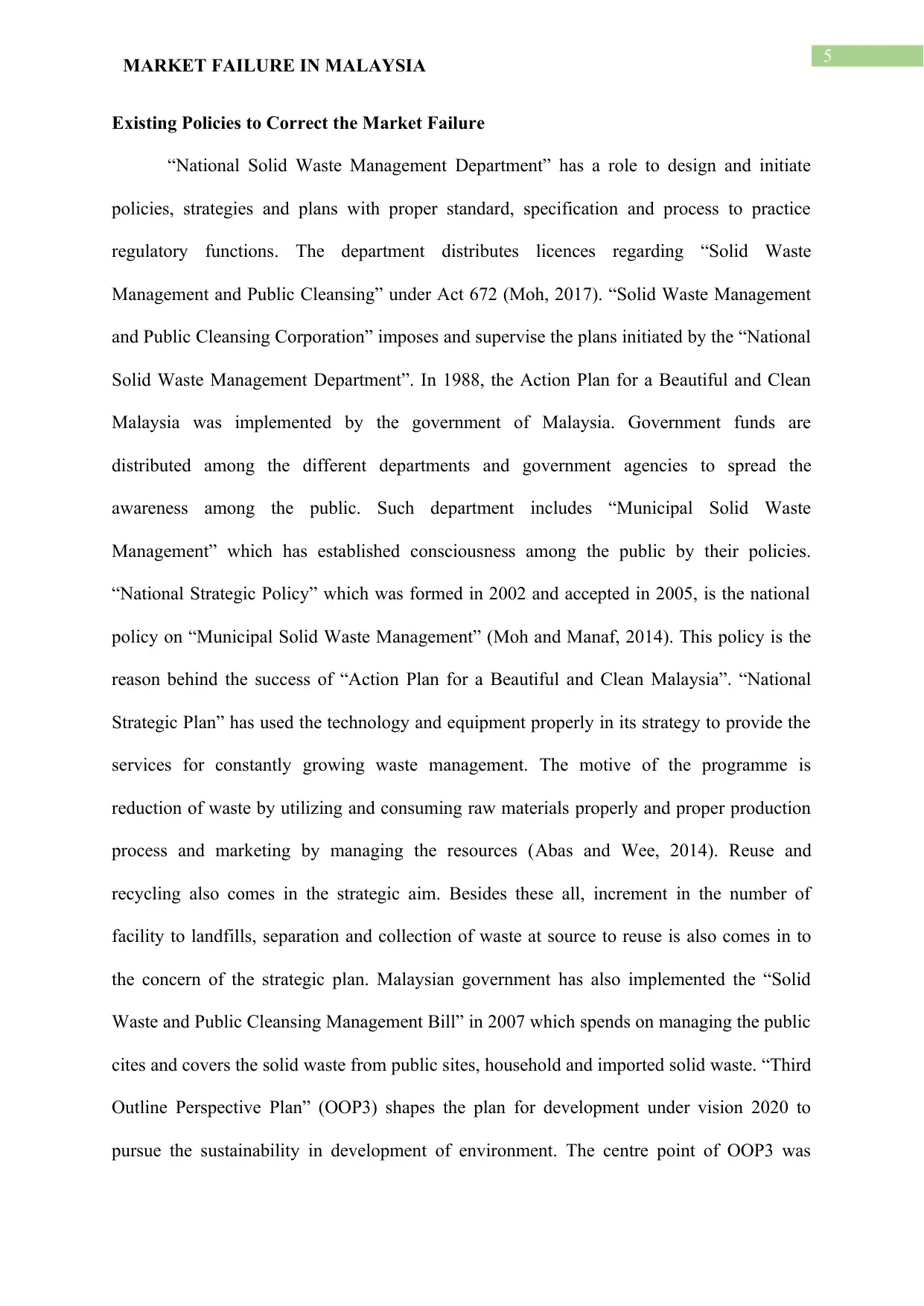
5MARKET FAILURE IN MALAYSIA
Existing Policies to Correct the Market Failure
“National Solid Waste Management Department” has a role to design and initiate
policies, strategies and plans with proper standard, specification and process to practice
regulatory functions. The department distributes licences regarding “Solid Waste
Management and Public Cleansing” under Act 672 (Moh, 2017). “Solid Waste Management
and Public Cleansing Corporation” imposes and supervise the plans initiated by the “National
Solid Waste Management Department”. In 1988, the Action Plan for a Beautiful and Clean
Malaysia was implemented by the government of Malaysia. Government funds are
distributed among the different departments and government agencies to spread the
awareness among the public. Such department includes “Municipal Solid Waste
Management” which has established consciousness among the public by their policies.
“National Strategic Policy” which was formed in 2002 and accepted in 2005, is the national
policy on “Municipal Solid Waste Management” (Moh and Manaf, 2014). This policy is the
reason behind the success of “Action Plan for a Beautiful and Clean Malaysia”. “National
Strategic Plan” has used the technology and equipment properly in its strategy to provide the
services for constantly growing waste management. The motive of the programme is
reduction of waste by utilizing and consuming raw materials properly and proper production
process and marketing by managing the resources (Abas and Wee, 2014). Reuse and
recycling also comes in the strategic aim. Besides these all, increment in the number of
facility to landfills, separation and collection of waste at source to reuse is also comes in to
the concern of the strategic plan. Malaysian government has also implemented the “Solid
Waste and Public Cleansing Management Bill” in 2007 which spends on managing the public
cites and covers the solid waste from public sites, household and imported solid waste. “Third
Outline Perspective Plan” (OOP3) shapes the plan for development under vision 2020 to
pursue the sustainability in development of environment. The centre point of OOP3 was
Existing Policies to Correct the Market Failure
“National Solid Waste Management Department” has a role to design and initiate
policies, strategies and plans with proper standard, specification and process to practice
regulatory functions. The department distributes licences regarding “Solid Waste
Management and Public Cleansing” under Act 672 (Moh, 2017). “Solid Waste Management
and Public Cleansing Corporation” imposes and supervise the plans initiated by the “National
Solid Waste Management Department”. In 1988, the Action Plan for a Beautiful and Clean
Malaysia was implemented by the government of Malaysia. Government funds are
distributed among the different departments and government agencies to spread the
awareness among the public. Such department includes “Municipal Solid Waste
Management” which has established consciousness among the public by their policies.
“National Strategic Policy” which was formed in 2002 and accepted in 2005, is the national
policy on “Municipal Solid Waste Management” (Moh and Manaf, 2014). This policy is the
reason behind the success of “Action Plan for a Beautiful and Clean Malaysia”. “National
Strategic Plan” has used the technology and equipment properly in its strategy to provide the
services for constantly growing waste management. The motive of the programme is
reduction of waste by utilizing and consuming raw materials properly and proper production
process and marketing by managing the resources (Abas and Wee, 2014). Reuse and
recycling also comes in the strategic aim. Besides these all, increment in the number of
facility to landfills, separation and collection of waste at source to reuse is also comes in to
the concern of the strategic plan. Malaysian government has also implemented the “Solid
Waste and Public Cleansing Management Bill” in 2007 which spends on managing the public
cites and covers the solid waste from public sites, household and imported solid waste. “Third
Outline Perspective Plan” (OOP3) shapes the plan for development under vision 2020 to
pursue the sustainability in development of environment. The centre point of OOP3 was
⊘ This is a preview!⊘
Do you want full access?
Subscribe today to unlock all pages.

Trusted by 1+ million students worldwide
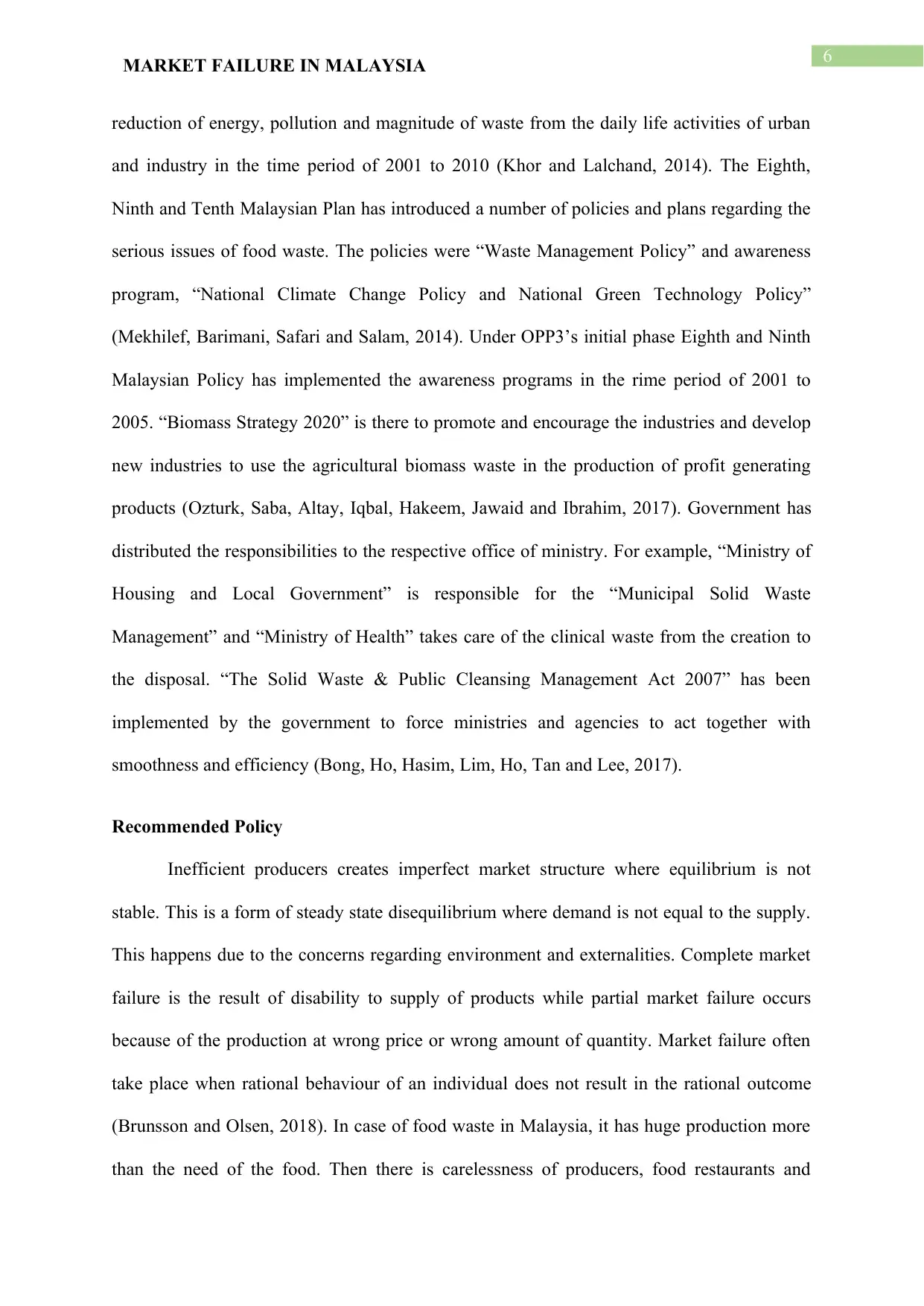
6MARKET FAILURE IN MALAYSIA
reduction of energy, pollution and magnitude of waste from the daily life activities of urban
and industry in the time period of 2001 to 2010 (Khor and Lalchand, 2014). The Eighth,
Ninth and Tenth Malaysian Plan has introduced a number of policies and plans regarding the
serious issues of food waste. The policies were “Waste Management Policy” and awareness
program, “National Climate Change Policy and National Green Technology Policy”
(Mekhilef, Barimani, Safari and Salam, 2014). Under OPP3’s initial phase Eighth and Ninth
Malaysian Policy has implemented the awareness programs in the rime period of 2001 to
2005. “Biomass Strategy 2020” is there to promote and encourage the industries and develop
new industries to use the agricultural biomass waste in the production of profit generating
products (Ozturk, Saba, Altay, Iqbal, Hakeem, Jawaid and Ibrahim, 2017). Government has
distributed the responsibilities to the respective office of ministry. For example, “Ministry of
Housing and Local Government” is responsible for the “Municipal Solid Waste
Management” and “Ministry of Health” takes care of the clinical waste from the creation to
the disposal. “The Solid Waste & Public Cleansing Management Act 2007” has been
implemented by the government to force ministries and agencies to act together with
smoothness and efficiency (Bong, Ho, Hasim, Lim, Ho, Tan and Lee, 2017).
Recommended Policy
Inefficient producers creates imperfect market structure where equilibrium is not
stable. This is a form of steady state disequilibrium where demand is not equal to the supply.
This happens due to the concerns regarding environment and externalities. Complete market
failure is the result of disability to supply of products while partial market failure occurs
because of the production at wrong price or wrong amount of quantity. Market failure often
take place when rational behaviour of an individual does not result in the rational outcome
(Brunsson and Olsen, 2018). In case of food waste in Malaysia, it has huge production more
than the need of the food. Then there is carelessness of producers, food restaurants and
reduction of energy, pollution and magnitude of waste from the daily life activities of urban
and industry in the time period of 2001 to 2010 (Khor and Lalchand, 2014). The Eighth,
Ninth and Tenth Malaysian Plan has introduced a number of policies and plans regarding the
serious issues of food waste. The policies were “Waste Management Policy” and awareness
program, “National Climate Change Policy and National Green Technology Policy”
(Mekhilef, Barimani, Safari and Salam, 2014). Under OPP3’s initial phase Eighth and Ninth
Malaysian Policy has implemented the awareness programs in the rime period of 2001 to
2005. “Biomass Strategy 2020” is there to promote and encourage the industries and develop
new industries to use the agricultural biomass waste in the production of profit generating
products (Ozturk, Saba, Altay, Iqbal, Hakeem, Jawaid and Ibrahim, 2017). Government has
distributed the responsibilities to the respective office of ministry. For example, “Ministry of
Housing and Local Government” is responsible for the “Municipal Solid Waste
Management” and “Ministry of Health” takes care of the clinical waste from the creation to
the disposal. “The Solid Waste & Public Cleansing Management Act 2007” has been
implemented by the government to force ministries and agencies to act together with
smoothness and efficiency (Bong, Ho, Hasim, Lim, Ho, Tan and Lee, 2017).
Recommended Policy
Inefficient producers creates imperfect market structure where equilibrium is not
stable. This is a form of steady state disequilibrium where demand is not equal to the supply.
This happens due to the concerns regarding environment and externalities. Complete market
failure is the result of disability to supply of products while partial market failure occurs
because of the production at wrong price or wrong amount of quantity. Market failure often
take place when rational behaviour of an individual does not result in the rational outcome
(Brunsson and Olsen, 2018). In case of food waste in Malaysia, it has huge production more
than the need of the food. Then there is carelessness of producers, food restaurants and
Paraphrase This Document
Need a fresh take? Get an instant paraphrase of this document with our AI Paraphraser
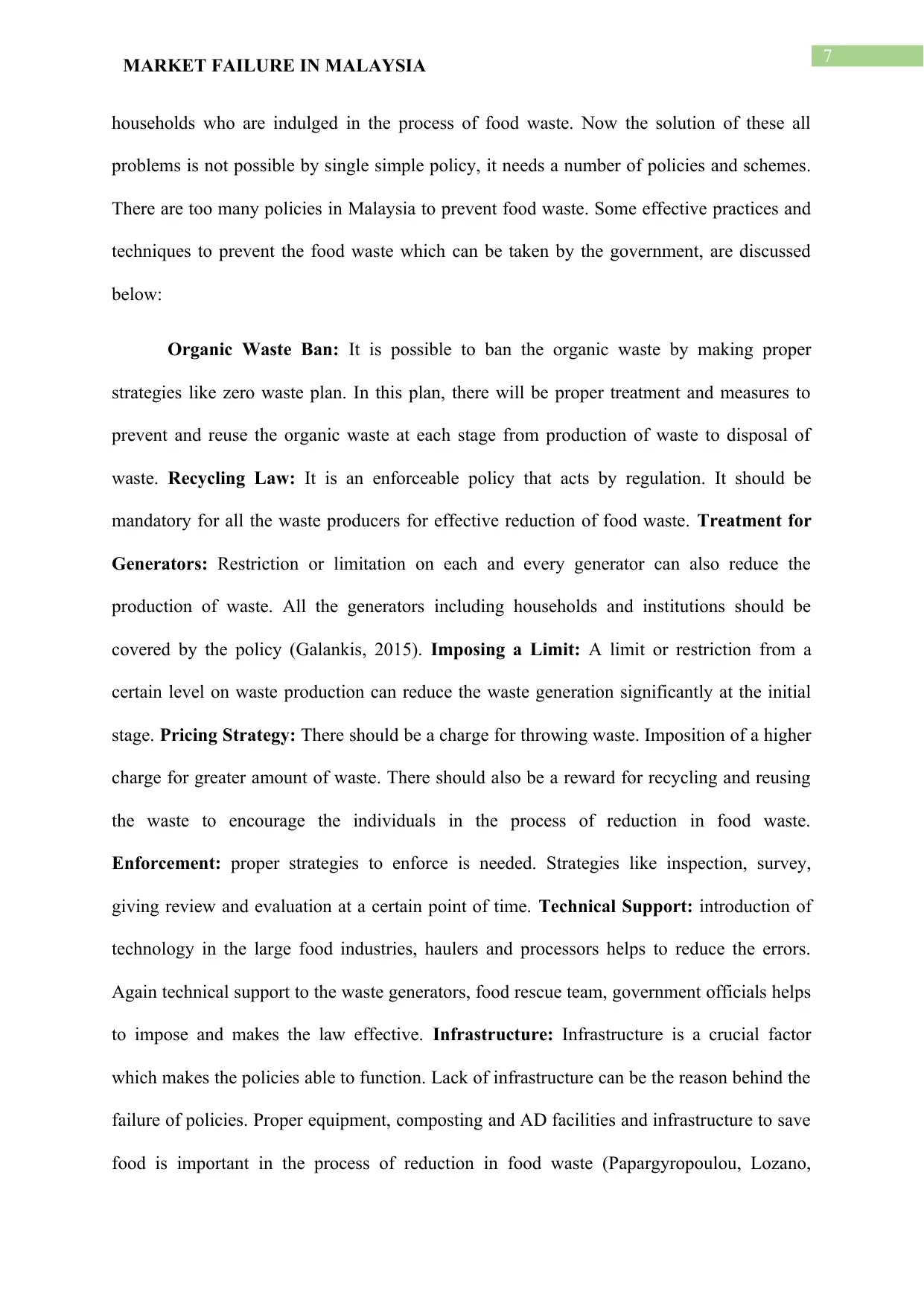
7MARKET FAILURE IN MALAYSIA
households who are indulged in the process of food waste. Now the solution of these all
problems is not possible by single simple policy, it needs a number of policies and schemes.
There are too many policies in Malaysia to prevent food waste. Some effective practices and
techniques to prevent the food waste which can be taken by the government, are discussed
below:
Organic Waste Ban: It is possible to ban the organic waste by making proper
strategies like zero waste plan. In this plan, there will be proper treatment and measures to
prevent and reuse the organic waste at each stage from production of waste to disposal of
waste. Recycling Law: It is an enforceable policy that acts by regulation. It should be
mandatory for all the waste producers for effective reduction of food waste. Treatment for
Generators: Restriction or limitation on each and every generator can also reduce the
production of waste. All the generators including households and institutions should be
covered by the policy (Galankis, 2015). Imposing a Limit: A limit or restriction from a
certain level on waste production can reduce the waste generation significantly at the initial
stage. Pricing Strategy: There should be a charge for throwing waste. Imposition of a higher
charge for greater amount of waste. There should also be a reward for recycling and reusing
the waste to encourage the individuals in the process of reduction in food waste.
Enforcement: proper strategies to enforce is needed. Strategies like inspection, survey,
giving review and evaluation at a certain point of time. Technical Support: introduction of
technology in the large food industries, haulers and processors helps to reduce the errors.
Again technical support to the waste generators, food rescue team, government officials helps
to impose and makes the law effective. Infrastructure: Infrastructure is a crucial factor
which makes the policies able to function. Lack of infrastructure can be the reason behind the
failure of policies. Proper equipment, composting and AD facilities and infrastructure to save
food is important in the process of reduction in food waste (Papargyropoulou, Lozano,
households who are indulged in the process of food waste. Now the solution of these all
problems is not possible by single simple policy, it needs a number of policies and schemes.
There are too many policies in Malaysia to prevent food waste. Some effective practices and
techniques to prevent the food waste which can be taken by the government, are discussed
below:
Organic Waste Ban: It is possible to ban the organic waste by making proper
strategies like zero waste plan. In this plan, there will be proper treatment and measures to
prevent and reuse the organic waste at each stage from production of waste to disposal of
waste. Recycling Law: It is an enforceable policy that acts by regulation. It should be
mandatory for all the waste producers for effective reduction of food waste. Treatment for
Generators: Restriction or limitation on each and every generator can also reduce the
production of waste. All the generators including households and institutions should be
covered by the policy (Galankis, 2015). Imposing a Limit: A limit or restriction from a
certain level on waste production can reduce the waste generation significantly at the initial
stage. Pricing Strategy: There should be a charge for throwing waste. Imposition of a higher
charge for greater amount of waste. There should also be a reward for recycling and reusing
the waste to encourage the individuals in the process of reduction in food waste.
Enforcement: proper strategies to enforce is needed. Strategies like inspection, survey,
giving review and evaluation at a certain point of time. Technical Support: introduction of
technology in the large food industries, haulers and processors helps to reduce the errors.
Again technical support to the waste generators, food rescue team, government officials helps
to impose and makes the law effective. Infrastructure: Infrastructure is a crucial factor
which makes the policies able to function. Lack of infrastructure can be the reason behind the
failure of policies. Proper equipment, composting and AD facilities and infrastructure to save
food is important in the process of reduction in food waste (Papargyropoulou, Lozano,
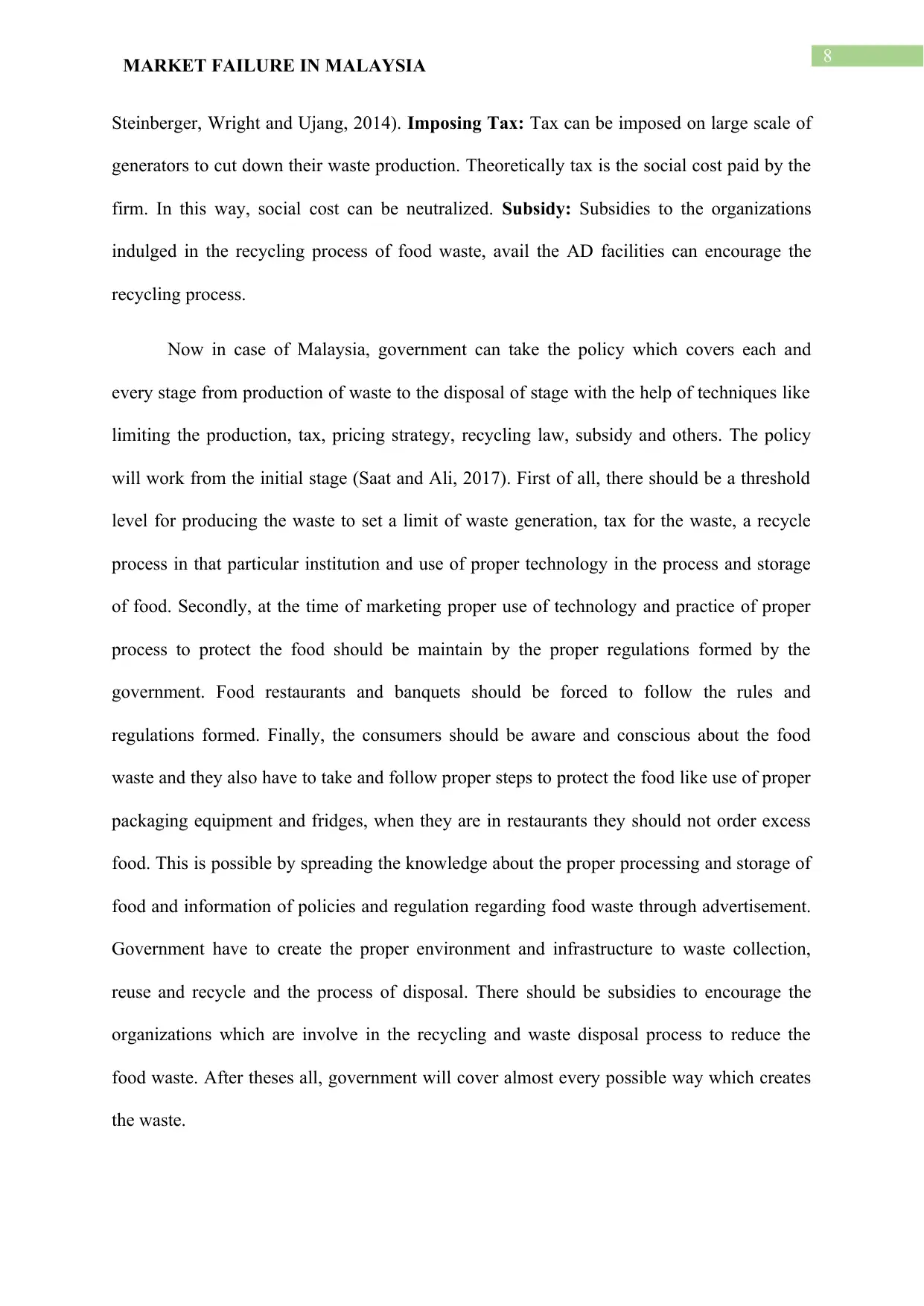
8MARKET FAILURE IN MALAYSIA
Steinberger, Wright and Ujang, 2014). Imposing Tax: Tax can be imposed on large scale of
generators to cut down their waste production. Theoretically tax is the social cost paid by the
firm. In this way, social cost can be neutralized. Subsidy: Subsidies to the organizations
indulged in the recycling process of food waste, avail the AD facilities can encourage the
recycling process.
Now in case of Malaysia, government can take the policy which covers each and
every stage from production of waste to the disposal of stage with the help of techniques like
limiting the production, tax, pricing strategy, recycling law, subsidy and others. The policy
will work from the initial stage (Saat and Ali, 2017). First of all, there should be a threshold
level for producing the waste to set a limit of waste generation, tax for the waste, a recycle
process in that particular institution and use of proper technology in the process and storage
of food. Secondly, at the time of marketing proper use of technology and practice of proper
process to protect the food should be maintain by the proper regulations formed by the
government. Food restaurants and banquets should be forced to follow the rules and
regulations formed. Finally, the consumers should be aware and conscious about the food
waste and they also have to take and follow proper steps to protect the food like use of proper
packaging equipment and fridges, when they are in restaurants they should not order excess
food. This is possible by spreading the knowledge about the proper processing and storage of
food and information of policies and regulation regarding food waste through advertisement.
Government have to create the proper environment and infrastructure to waste collection,
reuse and recycle and the process of disposal. There should be subsidies to encourage the
organizations which are involve in the recycling and waste disposal process to reduce the
food waste. After theses all, government will cover almost every possible way which creates
the waste.
Steinberger, Wright and Ujang, 2014). Imposing Tax: Tax can be imposed on large scale of
generators to cut down their waste production. Theoretically tax is the social cost paid by the
firm. In this way, social cost can be neutralized. Subsidy: Subsidies to the organizations
indulged in the recycling process of food waste, avail the AD facilities can encourage the
recycling process.
Now in case of Malaysia, government can take the policy which covers each and
every stage from production of waste to the disposal of stage with the help of techniques like
limiting the production, tax, pricing strategy, recycling law, subsidy and others. The policy
will work from the initial stage (Saat and Ali, 2017). First of all, there should be a threshold
level for producing the waste to set a limit of waste generation, tax for the waste, a recycle
process in that particular institution and use of proper technology in the process and storage
of food. Secondly, at the time of marketing proper use of technology and practice of proper
process to protect the food should be maintain by the proper regulations formed by the
government. Food restaurants and banquets should be forced to follow the rules and
regulations formed. Finally, the consumers should be aware and conscious about the food
waste and they also have to take and follow proper steps to protect the food like use of proper
packaging equipment and fridges, when they are in restaurants they should not order excess
food. This is possible by spreading the knowledge about the proper processing and storage of
food and information of policies and regulation regarding food waste through advertisement.
Government have to create the proper environment and infrastructure to waste collection,
reuse and recycle and the process of disposal. There should be subsidies to encourage the
organizations which are involve in the recycling and waste disposal process to reduce the
food waste. After theses all, government will cover almost every possible way which creates
the waste.
⊘ This is a preview!⊘
Do you want full access?
Subscribe today to unlock all pages.

Trusted by 1+ million students worldwide
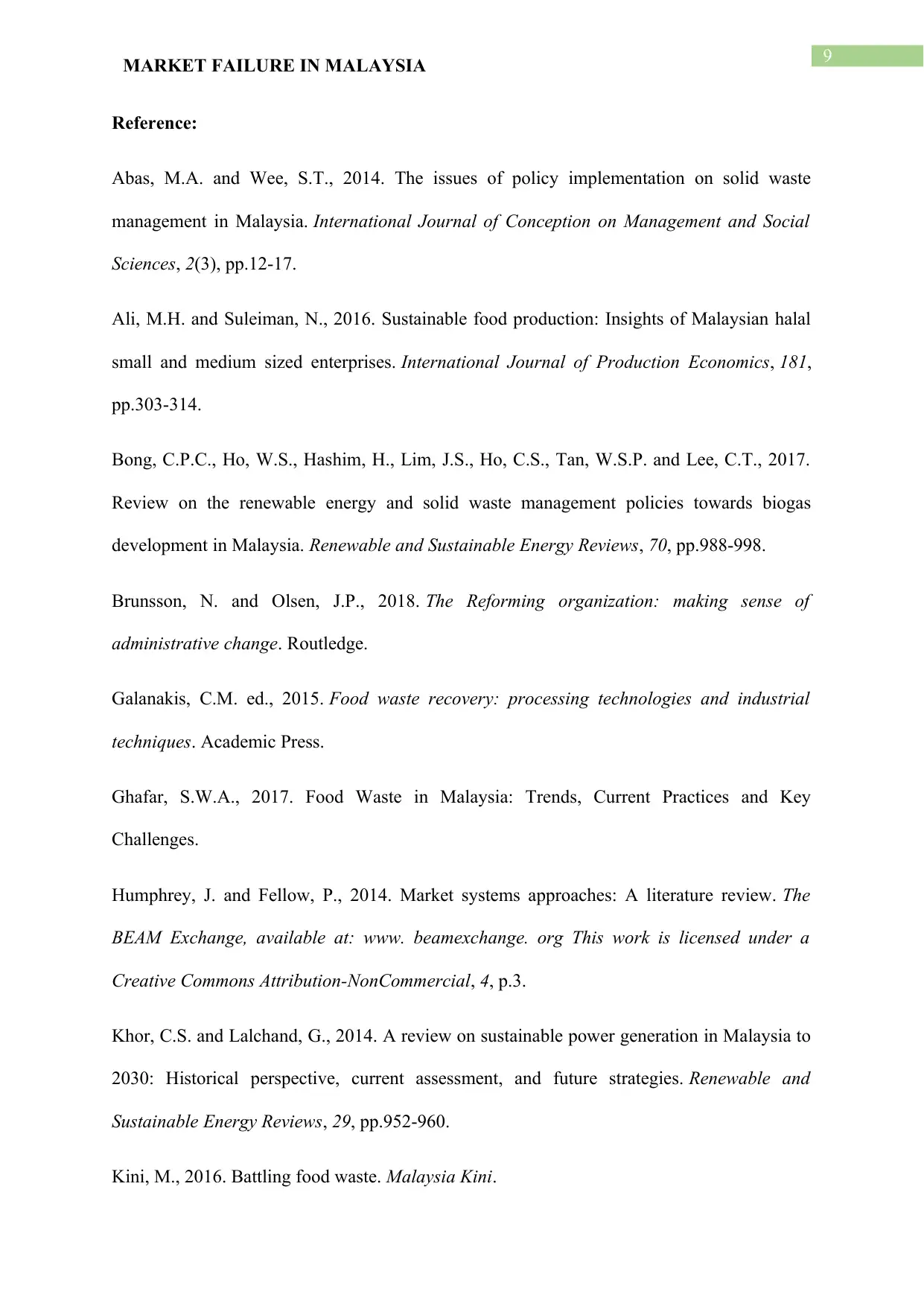
9MARKET FAILURE IN MALAYSIA
Reference:
Abas, M.A. and Wee, S.T., 2014. The issues of policy implementation on solid waste
management in Malaysia. International Journal of Conception on Management and Social
Sciences, 2(3), pp.12-17.
Ali, M.H. and Suleiman, N., 2016. Sustainable food production: Insights of Malaysian halal
small and medium sized enterprises. International Journal of Production Economics, 181,
pp.303-314.
Bong, C.P.C., Ho, W.S., Hashim, H., Lim, J.S., Ho, C.S., Tan, W.S.P. and Lee, C.T., 2017.
Review on the renewable energy and solid waste management policies towards biogas
development in Malaysia. Renewable and Sustainable Energy Reviews, 70, pp.988-998.
Brunsson, N. and Olsen, J.P., 2018. The Reforming organization: making sense of
administrative change. Routledge.
Galanakis, C.M. ed., 2015. Food waste recovery: processing technologies and industrial
techniques. Academic Press.
Ghafar, S.W.A., 2017. Food Waste in Malaysia: Trends, Current Practices and Key
Challenges.
Humphrey, J. and Fellow, P., 2014. Market systems approaches: A literature review. The
BEAM Exchange, available at: www. beamexchange. org This work is licensed under a
Creative Commons Attribution-NonCommercial, 4, p.3.
Khor, C.S. and Lalchand, G., 2014. A review on sustainable power generation in Malaysia to
2030: Historical perspective, current assessment, and future strategies. Renewable and
Sustainable Energy Reviews, 29, pp.952-960.
Kini, M., 2016. Battling food waste. Malaysia Kini.
Reference:
Abas, M.A. and Wee, S.T., 2014. The issues of policy implementation on solid waste
management in Malaysia. International Journal of Conception on Management and Social
Sciences, 2(3), pp.12-17.
Ali, M.H. and Suleiman, N., 2016. Sustainable food production: Insights of Malaysian halal
small and medium sized enterprises. International Journal of Production Economics, 181,
pp.303-314.
Bong, C.P.C., Ho, W.S., Hashim, H., Lim, J.S., Ho, C.S., Tan, W.S.P. and Lee, C.T., 2017.
Review on the renewable energy and solid waste management policies towards biogas
development in Malaysia. Renewable and Sustainable Energy Reviews, 70, pp.988-998.
Brunsson, N. and Olsen, J.P., 2018. The Reforming organization: making sense of
administrative change. Routledge.
Galanakis, C.M. ed., 2015. Food waste recovery: processing technologies and industrial
techniques. Academic Press.
Ghafar, S.W.A., 2017. Food Waste in Malaysia: Trends, Current Practices and Key
Challenges.
Humphrey, J. and Fellow, P., 2014. Market systems approaches: A literature review. The
BEAM Exchange, available at: www. beamexchange. org This work is licensed under a
Creative Commons Attribution-NonCommercial, 4, p.3.
Khor, C.S. and Lalchand, G., 2014. A review on sustainable power generation in Malaysia to
2030: Historical perspective, current assessment, and future strategies. Renewable and
Sustainable Energy Reviews, 29, pp.952-960.
Kini, M., 2016. Battling food waste. Malaysia Kini.
Paraphrase This Document
Need a fresh take? Get an instant paraphrase of this document with our AI Paraphraser
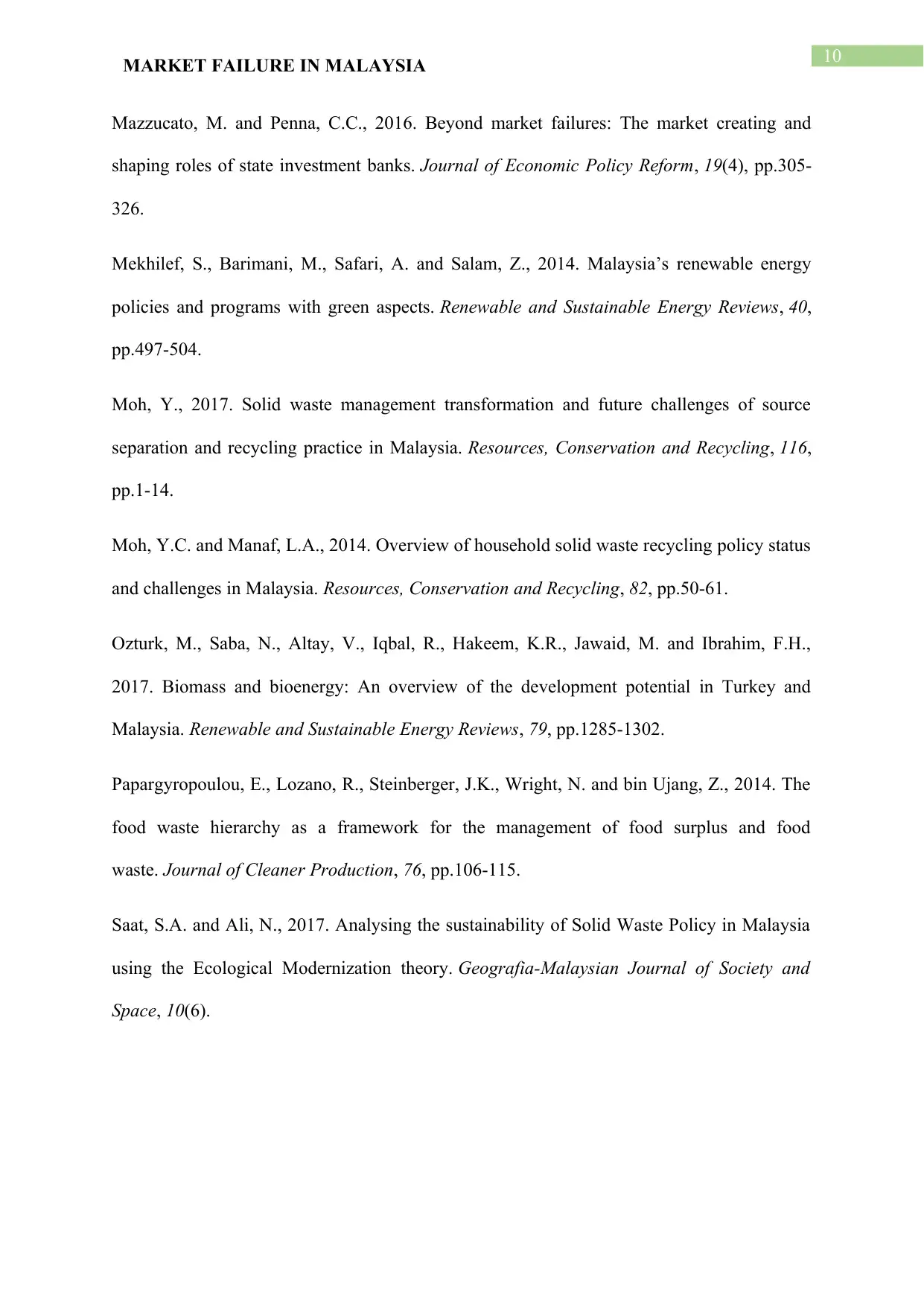
10MARKET FAILURE IN MALAYSIA
Mazzucato, M. and Penna, C.C., 2016. Beyond market failures: The market creating and
shaping roles of state investment banks. Journal of Economic Policy Reform, 19(4), pp.305-
326.
Mekhilef, S., Barimani, M., Safari, A. and Salam, Z., 2014. Malaysia’s renewable energy
policies and programs with green aspects. Renewable and Sustainable Energy Reviews, 40,
pp.497-504.
Moh, Y., 2017. Solid waste management transformation and future challenges of source
separation and recycling practice in Malaysia. Resources, Conservation and Recycling, 116,
pp.1-14.
Moh, Y.C. and Manaf, L.A., 2014. Overview of household solid waste recycling policy status
and challenges in Malaysia. Resources, Conservation and Recycling, 82, pp.50-61.
Ozturk, M., Saba, N., Altay, V., Iqbal, R., Hakeem, K.R., Jawaid, M. and Ibrahim, F.H.,
2017. Biomass and bioenergy: An overview of the development potential in Turkey and
Malaysia. Renewable and Sustainable Energy Reviews, 79, pp.1285-1302.
Papargyropoulou, E., Lozano, R., Steinberger, J.K., Wright, N. and bin Ujang, Z., 2014. The
food waste hierarchy as a framework for the management of food surplus and food
waste. Journal of Cleaner Production, 76, pp.106-115.
Saat, S.A. and Ali, N., 2017. Analysing the sustainability of Solid Waste Policy in Malaysia
using the Ecological Modernization theory. Geografia-Malaysian Journal of Society and
Space, 10(6).
Mazzucato, M. and Penna, C.C., 2016. Beyond market failures: The market creating and
shaping roles of state investment banks. Journal of Economic Policy Reform, 19(4), pp.305-
326.
Mekhilef, S., Barimani, M., Safari, A. and Salam, Z., 2014. Malaysia’s renewable energy
policies and programs with green aspects. Renewable and Sustainable Energy Reviews, 40,
pp.497-504.
Moh, Y., 2017. Solid waste management transformation and future challenges of source
separation and recycling practice in Malaysia. Resources, Conservation and Recycling, 116,
pp.1-14.
Moh, Y.C. and Manaf, L.A., 2014. Overview of household solid waste recycling policy status
and challenges in Malaysia. Resources, Conservation and Recycling, 82, pp.50-61.
Ozturk, M., Saba, N., Altay, V., Iqbal, R., Hakeem, K.R., Jawaid, M. and Ibrahim, F.H.,
2017. Biomass and bioenergy: An overview of the development potential in Turkey and
Malaysia. Renewable and Sustainable Energy Reviews, 79, pp.1285-1302.
Papargyropoulou, E., Lozano, R., Steinberger, J.K., Wright, N. and bin Ujang, Z., 2014. The
food waste hierarchy as a framework for the management of food surplus and food
waste. Journal of Cleaner Production, 76, pp.106-115.
Saat, S.A. and Ali, N., 2017. Analysing the sustainability of Solid Waste Policy in Malaysia
using the Ecological Modernization theory. Geografia-Malaysian Journal of Society and
Space, 10(6).
1 out of 11
Your All-in-One AI-Powered Toolkit for Academic Success.
+13062052269
info@desklib.com
Available 24*7 on WhatsApp / Email
![[object Object]](/_next/static/media/star-bottom.7253800d.svg)
Unlock your academic potential
Copyright © 2020–2025 A2Z Services. All Rights Reserved. Developed and managed by ZUCOL.
